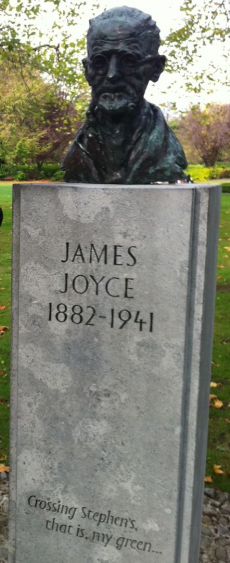
James Joyce (1882-1941) was an Irish author widely considered to be one of the most important novelists of the twentieth century and a key figure in the Modernist movement. His epic novel, Ulysses, is arguably his most well-known work and was considered by the Modern Library’s poll of literary experts to be the best English-language novel of the twentieth century. It is famous for its highly experimental style, with each episode in the book different from the last. It is probably because of this that Virginia Woolf - who wasn’t as much a fan of the novel as many of her contemporaries - said of the novel that it was “a memorable catastrophe—immense in daring, terrific in disaster."
The novel looks at a day in the lives of two citizens of the city of Dublin, Leopold Bloom and Stephen Dedalus, as they go about their business, with its plot based around that of Homer’s epic poem, the Odyssey. Joyce’s two protagonists are largely in contrast to each other.
Leopold Bloom is very much a man of material interests, being introduced to us thus, “Leopold Bloom Mr Leopold Bloom ate with relish the inner organs of beasts and fowls. He liked thick giblet soup, nutty gizzards, a stuffed roast heart, liver slices fried with crustcrumbs, fried hencods' roes.” He spends much of the novel thinking about the affair currently occurring between Molly Bloom, his wife, and a man named Hugh Boylan.
Stephen Dedalus, on the other hand, is much more interested in matters of an intellectual nature; in episode nine of the book, he goes to the National Library to offer to academics a theory regarding the works of Shakespeare and also discusses thinkers such as Plato and Aristotle. He is widely thought to be based on Joyce himself.
However, these two characters share something in common in that they have both come to know loss. Stephen Dedalus is in mourning for his mother, which places pressure on his Catholic faith and Leopold Bloom, who, along with Molly Bloom, is struggling to get past the death of his son, Rudy. It is the death of his son which is perhaps the reason for the breakdown of his marriage.
Yet in the last episode of the novel, “Penelope”, we arguably see the start of a turnaround in the Bloom household. In these last sixty pages of the novel we are entirely inside the mind of Molly Bloom whilst she lays in bed next to Bloom at the end of the day, the reader having to make sense of her unprocessed thoughts – as if the narrator is doing nothing but relay her inner monologue to us as readers.
We come to learn that Molly is not as unfaithful as Leopold Bloom makes out (He tells us in the episode before that he estimates he has cheated on him with twenty-five other men), that Boylan is in fact the first person whom she’s had an affair with – after ten years of a sexless marriage. And in the last few pages we see Molly recalling why she fell in love with Bloom in the first place, “I liked him because I saw he understood or felt what a woman is”, as well as her acceptance of his proposal of marriage to her, her thoughts concluding on the emphatically affirmative “yes I said yes I will Yes.”
This epically complex novel thus ends on a resoundingly hopeful note, with Molly Bloom’s last thoughts as she goes to sleep suggesting that hers’ and Leopold’s marriage might yet be saved.
Image: By Tomello (Own work) [CC BY-SA 3.0 (http://creativecommons.org/licenses/by-sa/3.0)], via Wikimedia Commons

0 Comment:
Be the first one to comment on this article.